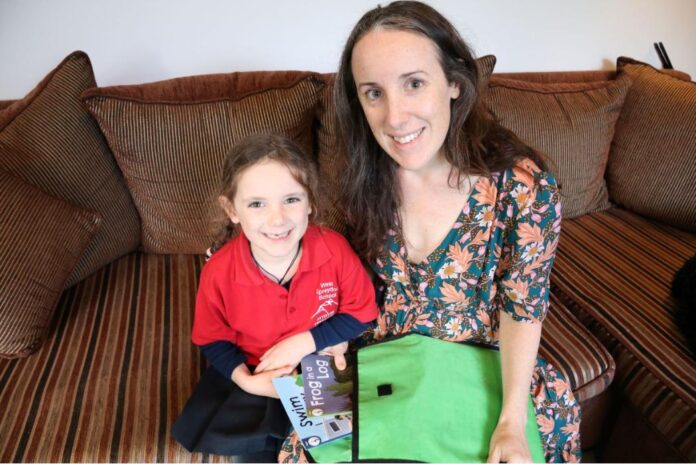Source: University of Canterbury
24 May 2021
Dr Amy Scott gets excited when her five-year-old daughter Ivy brings home her book bag from school.
-
Dr Amy Scott, pictured with daughter Ivy, is the programme coordinator for an innovative new microcredential programme for teachers under the Better Start Literacy Approach.
“As a mother, I want my children to be happy at school, and see themselves positively as learners. As a researcher, I know that getting off to a great start with reading has a huge impact on this. I love having the opportunity to work with hundreds of teachers and literacy specialists across New Zealand through the Better Start Literacy Approach, and I can’t wait to see the new readers turn up in her book bag!”
Dr Scott is the programme coordinator for an innovative new microcredential programme that provides training for teachers and literacy specialists across the country in the Better Start Literacy Approach. Semester one has seen 450 teachers and literacy specialists participating, reaching more than 4500 tamariki in their first year of school. Funding is available for a further 600 teachers and specialists to begin the course in July.
The Better Start Literacy Approach is an integrated classroom literacy approach for tamariki in Years 0 and 1, developed by a team of researchers at University of Canterbury’s (UC) Child Well-being Research Institute. It teaches letter-sound knowledge, phonological awareness, oral language, word reading and spelling through fun, game-based activities. It also integrates the new Ready to Read – Phonics Plus early readers series, developed by UC Professors Alison Arrow, Gail Gillon, Brigid McNeill and Dr Amy Scott, and recently published by the Ministry of Education as part of its new Early Literacy Approach.
These early readers have also been developed by the UC research team for tamariki in Aotearoa New Zealand, and form an important part of the Better Start Literacy Approach classroom teaching. They include beautiful illustrations of local flora and fauna, and New Zealand characters doing New Zealand things, like swimming sports, picking up rubbish at the local park and cheeky weka playing in the bush.
“It’s exciting for me to think about the enhancement to my daughter’s classroom literacy instruction, and particularly through a New Zealand-developed and researched programme,” says Dr Scott. “We know what works for New Zealand tamariki through our research trials with more than 1000 children, and I am really proud to be part something with such a strong evidence base.”
The Ready to Read – Phonics Plus books are an exciting addition to the Better Start Literacy Approach teaching, which uses them in small group reading sessions in the classroom, and for children to take home in their book bags and share with their whānau.
“What drives me as a researcher is thinking about the impact that our work has on thousands of children in New Zealand. And it’s not just the impact that we have in the classroom each day, but the impact that getting off to a strong start with reading will have over the lifetime of a child,” says Dr Scott.
“We know that early literacy success is an incredibly powerful predictor of later life outcomes. So while we’re focused on what’s happening in the classroom, right now, that’s having an impact on children’s ability to read and spell, the lifelong impact of that is huge in terms of educational success and positive life trajectories.
“All of these positive things come from having a strong foundation of literacy. You could say it all begins with the book bag!”
For more information on the Better Start Literacy Approach see www.betterstartapproach.com. Applications are now open for Ministry of Education-funded places in the next intake of teachers and literacy specialists in the Better Start Literacy Approach. Applications close on Thursday 3 June. For more information and to apply see https://pld.education.govt.nz/find-pld/bsla-professional-support



